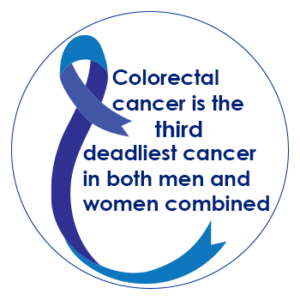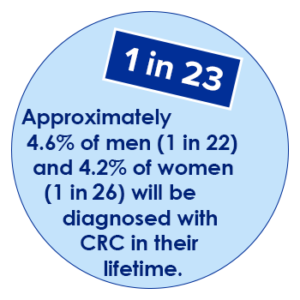Colorectal Cancer Facts
![]()
What is colorectal cancer?
Colon cancer, also known as colorectal cancer, is the development of malignant cells occurring in the colon (AKA large intestine) or in the rectum, and it often develops slowly. Before the cancer develops, an abnormal growth called a polyp develops on the inner lining of the large intestine or rectum. While polyps typically begin as noncancerous growths, some can turn into cancer over time.

What causes colon cancer?
There is no known cause (or causes) for colon cancer, but certain factors may increase the risk of getting the disease.
Risk factors include:
-
-
- Age: 45 and older
- Family history
- Inflammatory Bowel Disease, Crohn’s Disease, Ulcerative Colitis
- Genetic alterations
- A diet rich in fat and red meat
- Heavy alcohol use
- Cigarette smoking and tobacco use
- Obesity, diabetes, and lack of exercise
What are the symptoms of colon cancer?
There can be NO warning signs or symptoms of colon cancer in the early stages. Experiencing symptoms, can indicate that the cancer has advanced to a later stage.
If you start to experience any of the following symptoms, see your doctor right away to find out if the symptoms are being caused by colon cancer:
- A change in bowel habits, such as diarrhea or constipation that lasts for more than a few days
- A feeling that you need to have a bowel movement that is not relieved by having one
- Blood in your stool
- Cramping or stomach pain
- Weakness and fatigue
- Unintended weight loss

On average, the lifetime risk of developing colon cancer is about one in 23 for men and women combined (4.2%), however, this varies widely according to individual risk factors.
Who is at risk for colon cancer?- Anyone at the age of 50 and older is at risk for colon cancer.
Because 90% of the people diagnosed with colon cancer are age 45 and older, we recommend that initial screening begins at the age of 45.
- Anyone with a first-degree relative (parent, sibling, offspring) who has had colon cancer have a 1 in 3 change of developing colon cancer.
If this is the case, screening should begin at the age of 40, or 10 years prior to the age that the family member was diagnosed at (whichever is soonest).
How can one prevent colon cancer?
Get your colonoscopy! Any polyp can turn into cancer. If you fit the description of who is at risk, it’s important for you to get screened for the disease. Screening can find these polyps, which in time may turn into cancer, and can be removed during the exam. If colon cancer is found early enough, it is highly treatable. If you are at risk, don’t wait until you are experiencing symptoms to get tested for colon cancer.
What are the colon cancer screening choices?
There are two options that we recommend to people- colonoscopy or the Fecal Immunochemical Test (FIT).
Colonoscopy
The colonoscopy remains as the “gold standard” for colon cancer screening. It is an examination of the large intestine (colon) in which our GI doctors look for polyps, or abnormal growth tissue. While not all polyps develop into cancers, overtime many do and can be removed during the colonoscopy procedure. When polyps are removed, colon cancer is prevented. A colonoscopy can detect more than 95% of polyps and cancers and can reduce your chance of dying from it by greater than 70%. Thanks to newly implemented technological advances and improved pre-procedure preps, one can expect to have a more comfortable colonoscopy experience.If you are average risk and the result of your exam is normal, a colonoscopy is not needed for another 10 years.
Fecal Immunochemical Test (FIT)
If one is reluctant to have a colonoscopy, the recommended alternative is the Fecal Immunochemical Test (FIT). It’s a quick and simple test to detect blood in the stool that can be done in the comfort of your home. The kit comes with a dip stick that you dip into a stool sample, then placed in a screw top vial and mailed to the lab. For effectiveness, this method of colon cancer screening must be done every year. The FIT can detect about 70-80% of cancers and 20-25% of large polyps. Although the FIT is a good option for detecting colon cancer, it is not an exam that prevents colon cancer like the colonoscopy. A positive FIT test requires a follow-up colonoscopy evaluation.If you have had a colonoscopy or flexible sigmoidoscopy previously, please check with your doctor before doing the FIT.
If you are due for a colon cancer screening, or simply have any questions, please contact any one of our offices or our Colon Cancer Hotline at:
866-30-COLON (26566)References:
- “Colorectal Cancer.” American Cancer Society. American Cancer Society, Inc., 2020. Web. 20 Sept 2023. cdc.gov/pcd/issues/2022/22_0001.htm
accessed: 20 Sept 2023
-